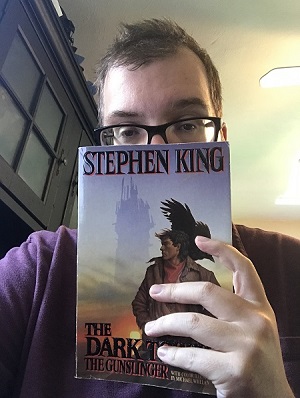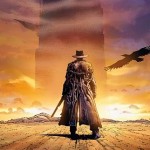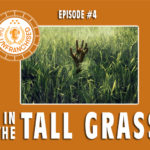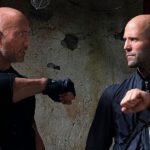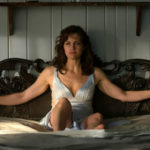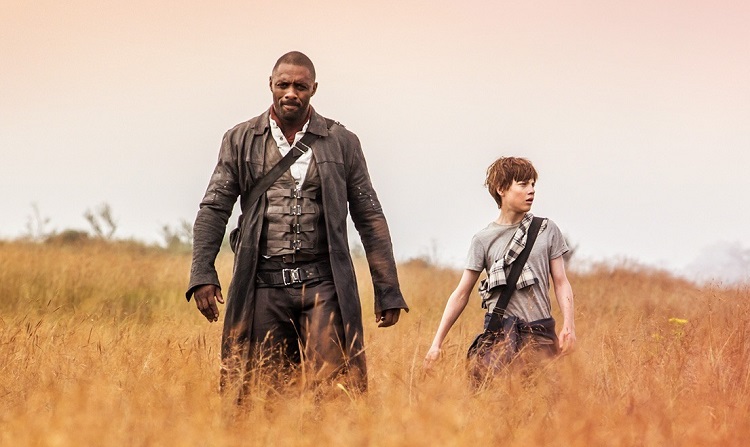
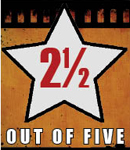
Had I never heard of Stephen King's The Dark Tower series of books and caught this movie late one night on Cinemax, I'd have likely thought, "Well, that wasn't terribly good, but at least it was well-cast and sort of appealingly weird."
That's not the truth of the situation though. The reality is I'm a fan of the books and have been since a teen, when the arrival of a new Dark Tower installment (released almost on the sly and only in large paperback format to the masses) was akin to a secret cosmic jolt coursing through the geek community. I continue to adore the first four books in that series, and five years ago, jotted down nearly 2,000 words on what I thought might be the best way to adapt King's universe into a film series. To this day, it's this site's most-read, most-commented-on post. Dark Tower fans have always been a passionate bunch.
So I don't know any other way to review this movie than as a fan. If that's not your thing, it's cool. I get it. Click over to my Atomic Blonde review or something. But adaptations of beloved books come bound with specific hopes and expectations. Trying to review them separate from that feels like folly, and I have no intention of doing so. The Dark Tower, the movie, is a very bad adaption. It's a jumble of characters, plots and ideas from the books, shaved down to their barest, most boring cores and then lined up to tell a version of the story that captures the rudiments but none of the imagination of King's words. It borrows much of its plotting from books six and seven in the saga (the two worst ones, BTW!) while ignoring the intoxicating, slow-burn beginning of an aging gunslinger traipsing across a desert to pursue a man in black and unravel the mystery of a large, looming tower.
The argument the creative team has put forward is that what's on the page is unadaptable. And maybe that's true. Re-reading my adaptation plan today makes me think I was overzealous, that no single movie could hold as much stuff as I wanted to jam in there. (Could The Gunslinger and The Drawing of the Three really be adapted together into one movie? Back then I thought so. Pondering it now, maybe not.) But if you're going to try to bring this universe to cinematic life, at least try, damn it! Yes, it's true that book one, The Gunslinger, doesn't read like it would translate into a traditional action-fantasy film. A straight adaptation may have been a bit challenging to audiences. But better to offer them a challenge than try to spoon-feed them what they're getting here — the bones of King's opus bent and broken into something a studio exec thinks has the best chance to score across four quadrants.
Mistake number one: The movie is called The Dark Tower, but there's no mystery or fantastical aura to the Tower itself. In the film, it's a big black tower we see a couple of times that Matthew McConaughy's evil wizard Walter lobs psychic cannonballs at. (Seriously. More on that later.) We are told right up front, very matter-of-factly, that the Tower is the center of all things, and when it's damaged, earthquakes and storms rock both New York City in our world along with Mid-World, King's version of Middle-Earth (less orcs, more cowboys). It would have been so much more interesting to reveal that fact to the viewer over the course of the narrative. To not know why this man Roland, the last of the Gunslingers, is on a quest to save this Tower, only to later reveal to him and us that it's not just his dying universe that's at stake but ALL of the universes, including ours!
This movie has no interest in big reveals, however. Director Nikolaj Arcel, who also has a screenwriting credit on the film along with Akiva Goldsman, Jeff Pinkner and Anders Thomas Jensen, puts our world front and center, starting the movie in New York and going so far as to make Jake, a troubled 11-year-old with psychic abilities, the de facto lead while limiting Roland and Walter to something dangerously close to supporting players. Jake is an important character from the books, but his complex back-story from the novels (involving sacrifice and split timelines) is reduced here to "he has visions." Tom Taylor is fine in the role, but he's never asked to do much more than play a generic YA-type hero.
Arcel also changes the very nature of Roland's quest. In the film, Roland's obsession is not the Tower but Walter himself. Walter murdered Roland's father, and Roland, weary and nearly defeated, wants vengeance before the world ends. Pure revenge may be an easier motive to grasp, but it's a let-down from the higher calling Roland adheres to in the books. There are hints at the end of the film that Roland has rediscovered a path familiar to readers, but it's left too vague for my liking. And, of course, a renewed dedication to the Tower would be left for a sequel we're almost certainly not going to get.
None of this is the fault of Idris Elba who effectively portrays Roland Deschain in appearance and in manner. He carries most of the qualities you would expect form the character: He's gruff, stoic, battle-hardened and knightly. Plus, he looks great in a duster. However, thanks to the movie's bare-bones plotting and brisk pace (it's only 95 minutes), he doesn't get to fully flesh out the role like one would hope. There's a short section in the middle of the film where Roland and Jake visit a small Mid-World town. (I didn't catch the name, but it's not much different from Calla Bryn Sturgis or some of the other villages Roland's ka-tet visit in the books.) The villagers act reverential toward Roland, calling him "sai" and such, and I was hoping that, just for a few minutes, Roland would return their hospitality, palaver with the town elders and talk about the state of Mid-World and the Gunslinger's place in it. A small break like that would add texture to not just the character but to the universe the movie is trying to create. Unfortunately, it doesn't happen, as Roland quickly dismisses the first villager he comes across to move on to the next cog in the plot. Even worse, the film's final act takes Jake and Roland back to New York, where it turns into a fish-out-of-water story with Roland eating hot dogs for the first time and insulting a couple of scantily dressed teenagers on a public bus. There's no doubt that different people wanted different things from this story, but I'm pretty sure no one wanted it to morph into Star Trek IV.
Similar problems plague the film's version of Walter, aka the Man in Black, aka ultimate King "big bad" Randall Flagg (never called that here, likely for rights-related reasons). McConaughey goes big and chews scenery in the role, but I was okay with him doing so. Flagg has always been written as a showman, a being that flaunts his evil in the face of anyone looking his way. Again, the issue is that the character is written with very little nuance. Instead of being an enigmatic, egomaniacal trickster working behind-the-scenes for a higher power (the Crimson King is referenced in graffiti in the film but never mentioned), Walter is just an asshole who wants to destroy the Tower and allow the monsters it keeps at bay to consume all realities. He works out of a cheap-looking military base, where his minions strap psychic kids to chairs that harness their powers to launch psychic bombs at the Tower. (I'm not a big fan of the Breakers in the books, but the movie manages to make the concept even worse.) Also, Walter's powers are really fucking stupid. Twice, he tells people to stop breathing and they do so, keeling over and dying. He's basically a god, with the ability to insta-kill everyone except for Roland, who is immune to his powers for reasons the film never attempts to explain.
The Dark Tower devotes very little time to anyone outside of the three main characters. Jackie Earle Haley plays the leader of the Taheen, a race of villainous humanoids with animal-like faces that disguise themselves as humans, but he never factors into the story all that much. (The effects work on the Taheen looks pretty good, though it's severely underused. All but one is usually wearing their "human" face.) Dennis Haysbert appears in flashbacks during an extremely bastardized account of the Battle of Jericho Hill. Fran Kranz shows up as one of Walter's tech people, allowing everyone who loves The Cabin in the Woods to lean over to their date and say, "Hey, I know that guy." No one leaves much an impact, yet another disappointment considering the odd and memorable cast of characters that move in and out of the novels.
And it's here that the self-realization kicks in and I realize this review could be dismissed as "it's not like the books so he doesn't like it." I acknowledge it. I'm wary of it. Yet this is how adaptations are honestly processed by anyone who's a big fan of the source material. There are reasons these novels are as beloved as they are. Just enough of them are ported over to likely make this a passable movie-going experience for non-readers. Again, Elba cuts a striking pose blasting his six-guns at odd creatures disguised as humans. Most fantasy universes extricate themselves from the real world immediately, making The Dark Tower — which creates a whole other world but ties it to our own — an interesting variation in the genre. Even though it's a neutered, super-streamlined version of the books, it's still certainly weirder than The Hunger Games and most of the other big fantasy franchises that have filled up multiplexes in recent years. Weird counts for something.
But the experience is completely different for fans, who won't be able to dismiss the "what might have been" itch scratching at the back of their brains. For me, it's just too jarring and unpleasant to hear the words "the man in black fled across the desert, and the gunslinger followed" echo throughout the theater during one of Jake's visions yet be almost comically antithetical to what's happening on screen. The movie does this over and over — throws bones to the fans in the most meaningless of ways. No rose in a vacant lot for you; take the rose graffiti in the background of a scene instead. Arcel and everyone else involved probably thought we'd get a kick out of these little nods. I mostly just found them insulting — hurtful reminders of what might have been.
